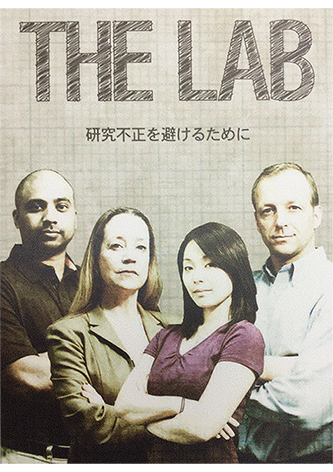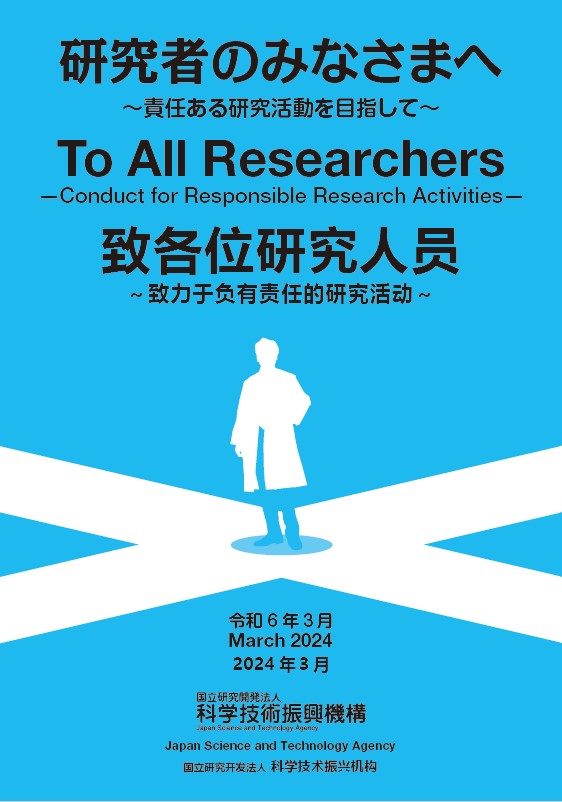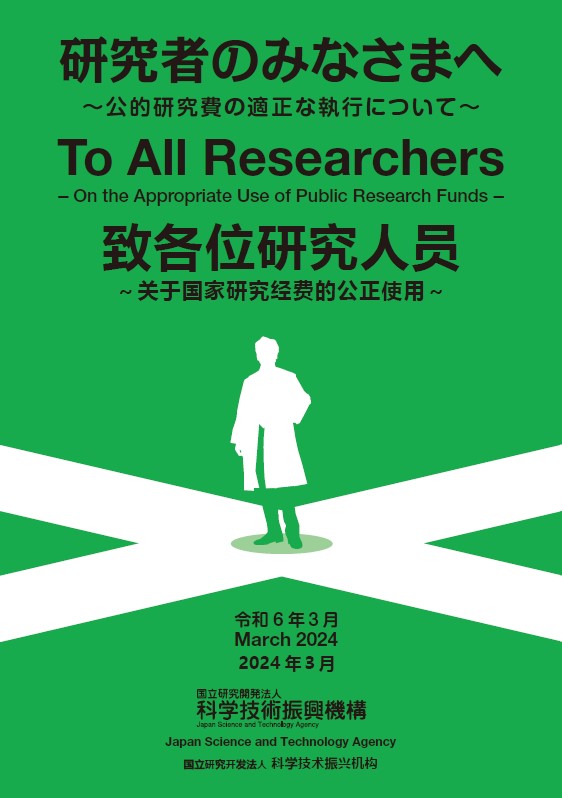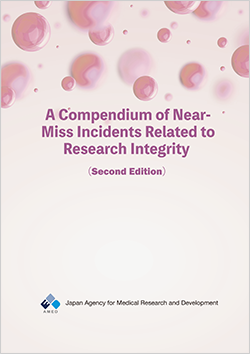The Lab
 "The Lab" is an interactive video material produced by the Office of Research Integrity, USA. This is available in English, Japanese, Spanish and Chinese.
"The Lab" is an interactive video material produced by the Office of Research Integrity, USA. This is available in English, Japanese, Spanish and Chinese.
This is a collection of links to educational materials to prevent research misconduct.
 "The Lab" is an interactive video material produced by the Office of Research Integrity, USA. This is available in English, Japanese, Spanish and Chinese.
"The Lab" is an interactive video material produced by the Office of Research Integrity, USA. This is available in English, Japanese, Spanish and Chinese.
 This is a booklet created by JST which summarizes what is research misconduct (fabrication, falsification and plagiarism) in research activities and preventive measures against misconduct in an easy-to-understand manner.
This is a booklet created by JST which summarizes what is research misconduct (fabrication, falsification and plagiarism) in research activities and preventive measures against misconduct in an easy-to-understand manner.
 This is a booklet created by JST which summarizes the types and examples of misappropriation of research funds and preventive measures against misconduct in an easy-to-understand manner.
This is a booklet created by JST which summarizes the types and examples of misappropriation of research funds and preventive measures against misconduct in an easy-to-understand manner.
This is the English version of "For the Sound Development of Science - The Attitude of a Conscientious Scientist -" created by Japan Society for the Promotion of Science (JSPS). It describes what you need to know when conducting research, which is common to all fields from humanities/social sciences to natural sciences. (February 2015)

This is an e-learning material created by Japan Society for the Promotion of Science (JSPS) based on "For the Sound Development of Science - The Attitude of a Conscientious Scientist -". You can learn about research integrity through case studies.
 This casebook was published by AMED(2021) to serve as an effective educational material that can be utilized in researcher-participation educational programs (such as a discussion format), by introducing practical cases on research misconduct, bioethics violation, and conflict of interest that have been recorded in Japan and the rest of the world, and presenting the issues and problems.
This casebook was published by AMED(2021) to serve as an effective educational material that can be utilized in researcher-participation educational programs (such as a discussion format), by introducing practical cases on research misconduct, bioethics violation, and conflict of interest that have been recorded in Japan and the rest of the world, and presenting the issues and problems.
 This is a collection of case studies published by AMED. The second edition includes 21 new cases (52 cases in total) added from the first edition . The contents of the second edition includes "near-miss" incidents related to research integrity, such as cases where the researcher almost committed an inappropriate research act but avoided it by being pointed out by others.
This is a collection of case studies published by AMED. The second edition includes 21 new cases (52 cases in total) added from the first edition . The contents of the second edition includes "near-miss" incidents related to research integrity, such as cases where the researcher almost committed an inappropriate research act but avoided it by being pointed out by others.
 This is a manual prepared by Japan Agency for Medical Research and Development(AMED) (2025) on proper image processing for biological images based on journal submission rules. It explains the image processing norms explicitly stated in journals, appropriate image processing methods, and image processing techniques that should not be applied, along with abundant examples.
This is a manual prepared by Japan Agency for Medical Research and Development(AMED) (2025) on proper image processing for biological images based on journal submission rules. It explains the image processing norms explicitly stated in journals, appropriate image processing methods, and image processing techniques that should not be applied, along with abundant examples.

This is an e-learning material created by Association for the Promotion of Research Integrity (APRIN).

JST is offering free access to "Education for Research Ethics and Integrity on Peer Review" (for the medical and life sciences, engineering, and humanities) with the cooperation and provision of teaching materials by APRIN.
In the "Notice on the Prevention of Inappropriate Conduct in Peer Review" issued by the MEXT on November 14, 2023, in view of the response from the Science Council of Japan, each research institution is required to strengthen its efforts to provide research ethics education on peer review. Please use these materials for training at your institution.

This is an online teaching material open to public, which was produced by Tokyo Institute of Technology (Tokyo Tech). Students studying engineering, science, and technology at universities can learn "well-being," which is the original meaning of ethics. (June 2017)
The "Solar Blind" is a video teaching material for engineering ethics education designed and produced by Kanazawa Institute of Technology(KIT). This material is intended to help engineers think about how to act to overcome problems under various restrictions and pressures. It is also effective as an educational material for research ethics. (2009)
This is a report issued by the National Academies of Sciences, Engineering, and Medicine (NASEM), which summarizes practical options for preventing research misconduct. The report clarifies best practices in research and recommends practical options for preventing research misconduct. (April 11, 2017)
This is a guideline compiled by the National Academies of Sciences, Engineering, and Medicine (NASEM). You can learn about research integrity through case studies. (The third edition issued in 2009)

Designed for use in research laboratories, the guidelines are intended to support open discussions in settings such as journal clubs, progress report meetings, or when welcoming new members.